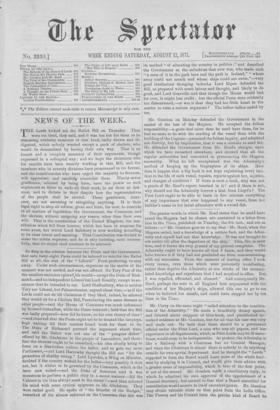So deep is the scission between the Peers and the
Government, that only forty-eight Peers could be induced to vote for the Ballot Bill at all, the rest of the " Liberal" Peers preferring to stay away. Under such circumstances, argument on the merits of the measure was not needed, and was not offered. No Tory Peer of the the smallest eminence opened;his mouth—except the Duke of Rich- mond—and no independent Liberal but Lord Romilly, except to an- nounce that be intended to rat, Lord Shaftesbury, who is neither Tory nor Liberal, but Palmerstonian, argued about time,—as if the Lords could not sit till Christmas if they liked, indeed, he allowed they would sit for a Cholera Bill, Peers having the same diseases as other people—said the House of Commons was much influenced by licensed victuallers, while the Peers were not ; held that the Bill was badly prepared—how did he know, on his own theory of time? —and observed that the Peers ought not to be treated like lacqueys, kept waiting till their masters found work for them to do, The Duke of Richmond pursued the argument about time, and said the Ballot was not one of the "pungent dishes" offered by Mr. Gladstone to the people of Lancashire, and there- fore the electors ought to be consulted,—his idea clearly being to force on a dissolution without the ballot, and so gain one more Parliament,—and Lord Harrowby thought the Bill one "for the protection of shabby voting." Lord Lyveden, a Whig ex-Minister, doubted if the country wished for the ballot—very possibly it does not, but it wishes to be governed by the Commons, which is the issue now raised—and the Duke of Somerset said it was monstrous to perform a public duty in a secret manner—did the Cabinet in his time always meet in the street 7—and then relieved his mind with some cynical epigrams on Mr. Gladstone. They were rather good. He spoke of "the blunder of the Budget," remarked of the silence enforced on the Commons that this was its method "of educating the country in politics ;" and described the Government as the unluckiest that ever was, who made such "a mess of it in the park here and the park in Ireland," "whose army could not march and whose ships could not swim,"—very good intellectual thouging indeed.. Lord Ripon defended the Bill, as prepared with much labour and thought, and likely to do good, and Lord Granville said that though the House would last for ever, it might lose credit ; but the official Peers were evidently too disheartened,—or was it that they had too little heart in the matter to raise a serious argument? The talkee-talkee ended by ten.






























